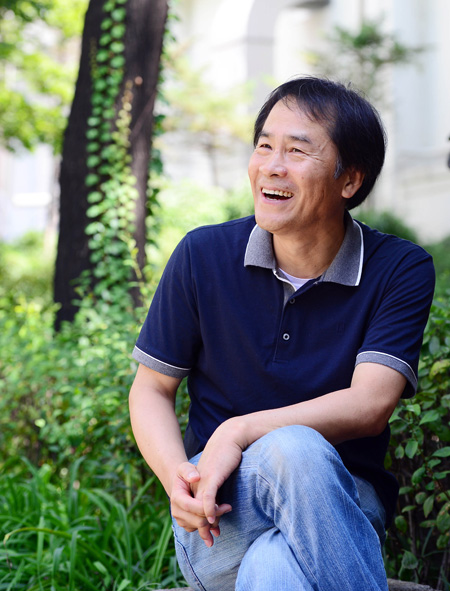- California Assembly OKs highest minimum wage in nation
- S. Korea unveils first graphic cigarette warnings
- US joins with South Korea, Japan in bid to deter North Korea
- LPGA golfer Chun In-gee finally back in action
- S. Korea won’t be top seed in final World Cup qualification round
- US men’s soccer misses 2nd straight Olympics
- US back on track in qualifying with 4-0 win over Guatemala
- High-intensity workout injuries spawn cottage industry
- CDC expands range of Zika mosquitoes into parts of Northeast
- Who knew? ‘The Walking Dead’ is helping families connect
Korean author joins top French literary series
Lee Seung-u’s books leave very little lost in translation
By Chung Ah-young
Widely known for his interest in Korean literature, Jean-Marie Gustave Le Clezio, the 2008 Nobel Laureate for Literature, mentioned Lee Seung-u as a likely candidate for the prize, along with other Korean writers such as Anatoly A. Kim and Hwang Sok-yong.
Lee might not be a household name yet in his native land. But in France, he is one of rare foreign authors who have had their work included in a Gallimard Folio edition.
“Ici Comme Ailleurs,” (Here and Elsewhere) which was first published by Zulma, a French publisher, in 2012 with support from the Daesan Foundation, was recently selected for the Folio series. This is the second time for Lee after his novel “La Vie Revee des Plantes” (The Private Lives of Plants) became the first work by a Korean author to have a title included in 2009.
Along with “Ici Comme Ailleurs,” his other work such as “The Reverse Side of Life” and “The Private Lives of Plants” were translated into French in 2000 and 2006 respectively by Zulma, receiving rave reviews from French media and critics.
Since its inception in 1972, the Folio series has published some 5,300 titles in 17 different fields. In particular the editions are renowned for publishing literary masterpieces by Jean-Paul Sartre, Albert Camus, Ernest Hemingway, Andre Gide and others.
The series has introduced literary works in 30 languages from 60 countries. Some 30 authors whose work is published as the Folio series such as Le Clezio and Herta Muller won the Nobel Prize for Literature. Among the Folio series, foreign literary work represents one third. It is hard for foreign authors to be included in the series because their work is mostly published by small publishing houses.
Lee’s recent Folio edition proves that he is more widely recognized in France than in Korea. In 2000, “The Reverse Side of Life” was a finalist for the Prix Femina of France in the category of foreign literature. “The Private Lives of Plants” became the first Korean work in a Gallimard Folio edition.
The French daily Le Monde described Lee’s novel at the time as “a moving, weighty novel that has emerged from a quiet, serious soul.” Le Figaro wrote that it’s “a great novel in which abundant, powerful images have brought to life the mythical dimension of love.”
His work has been translated by prominent French translators ― Choi Mi-kyung and Jean-Noel Juttet. Lee will take part in Place aux Nouvelles in Lauzerte, a literary festival in France, as a guest author next year.
He was born in Jangheung in South Jeolla Province, graduated from Seoul Theological University, and studied at the United Graduate School of Theology at Yonsei University. Since beginning his literary career in 1981 with “The Portrait of Erysichthon,” Lee has mostly delved into the themes relevant to Christian salvation.
His world of literature, which mostly deals with existentialism and human struggles between sanctity and secularism, has something in common with philosophical and ideological quests frequently found in French literature.
The Daesan Foundation said that his popularity in France lies in its mixture of Western points of view and Asian values, which evokes strangeness and exotic atmosphere among the French readers. The detailed descriptions of human internal viewpoints and sarcastic perceptions of lives written about full of ironies are also characteristic of his work.
Also one of the reasons behind his growing presence in France is the high quality of translation, in which original meaning and contact is kept almost intact from the original. “Lee’s writings have superb descriptions and symbolism. But the translation solves this daunting task into the excellent French language,” the foundation said.
The most common flaw found in Korean literary works when translating is redundancy. For example, author Lee Chung-jun’s works repeat similar sentences to emphasize pent-up emotions but this is largely avoided in French. So in that case, repeated sentences or words are often omitted during translation but it can mar the author’s original intentions. In Lee Seung-u’s work, however, there is almost no loss of sentences or words in translation, holding together both originality and readability, hard objectives to achieve in translated literature, according to the foundation.
Aside from Lee, Kim Ae-ran’s “My Palpitating Life,” Choi Jae-hoon’s “Seven Cat Eyes,” Kim E-seol’s “Welcome” and Koo Byung-mo’s “The Greatest Fish” published by Philippe Picquier, a French publisher specializing in Asian literature, are winning the hearts of the French readers.
Moon Chung-hee’s “Celle qui Mangeait le Riz Froid,” a poetry collection published last October in France, received positive reviews in French literary circles and media. A French radio show introduced Moon’s poems in an hour-long program, describing them as “works that move the hearts of readers using daily subjects.”
Moon was invited to various literary events in France. Last year, Korean literature including her poems was featured in PO&SIE, a quarterly French poetry magazine.













